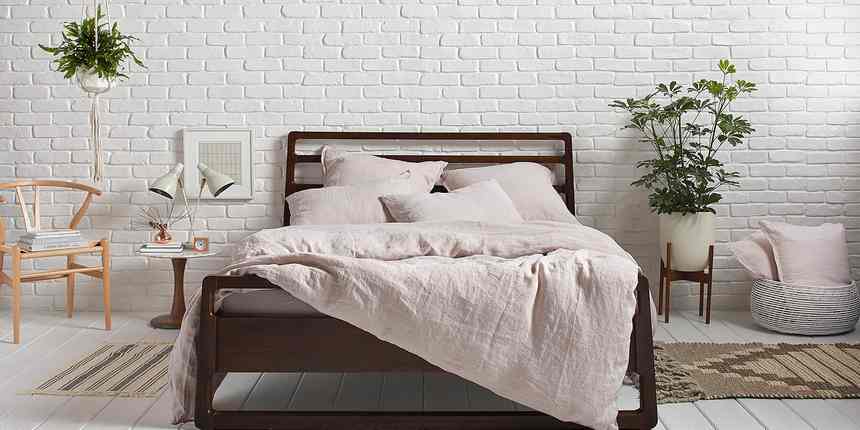You probably don't need to be reminded that getting eight hours of sleep per night is crucial to your health. Unfortunately, clocking those eight hours might feel like an impossible task when you're so busy planning a wedding-and it's especially tough when you can't get comfortable once you're actually in bed. When falling and staying asleep feels like another task on your endless list of to-dos, it might be time to make some changes. And what better time to do just that than before you register for wedding gifts or move in to your first home together?
Enter Ariel Kaye, the founder and CEO of Parachute. She and her Venice Beach-based home essentials company are redefining bedroom comfort, and are helping people reclaim their sleep schedules as a result. To better understand the makings of the ultimate bed, we asked Kaye and Dr. Gary Zammit, the executive director of New York's Sleep Disorder Institute, to explain how staying cozy under the covers leads to better sleep quality. Here's everything you need to know-from proper mattress testing methods to thread count myths-about turning your bed into a paradise.
EVERYTHING YOU NEED TO GET YOUR BEAUTY SLEEP BEFORE THE WEDDING
Find the perfect mattress and pillow.
"People who are comfortable in bed sleep more comfortably. It's that simple," said Zammit. The path to sleeping comfortably starts with a sturdy (but soft) mattress and supportive pillows, which means thoroughly testing multiple varieties is absolutely necessary. "Don't just sit on them and bounce up and down," Zammit advised. "Lay down on the mattress and stay there for 10 or 15 minutes. Don't be bashful about doing this, and don't let anyone rush you into making your decision."
Invest in high-quality bedding.
According to Zammit, choosing bedding is worth the time and investment. "You should be giving the purchase as much attention as you would when buying a car," he explained.
 Credit: Courtesy of Parachute
Credit: Courtesy of Parachute
Choose comfortable, skin-safe fabrics.
Surprisingly, super-soft, luxurious bedding has nothing to do with thread count. "What actually matters more is the caliber of the fibers," Kaye explained. Most importantly, sleeping on quality fibers reduces your risk of skin discomfort. Watch out for synthetic bedding that purports "wrinkle-free" and "permanent-press" claims, which mean that the fabrics might be treated "with formaldehyde resin, a toxic chemical," she continued. "Instead, you should look for bedding that is Oeko-Tex certified, meaning free of harmful chemicals or toxins."
If you know your body reacts to a specific textile, study the labels while sheet shopping. "Those who have a reaction to certain types of fabric during the day, are probably aware that they should avoid that type at night," said Zammit.
Determine your goal level of warmth.
Figure out whether you sleep hot or cold, as this will inform the fabrics you should choose. "I recommend our cool, crisp percale for those who get hot at night. It's extremely breathable. For those that get cold at night, I suggest sateen because the weave is a little tighter," Kaye said. If you fall somewhere in the middle, "linen works year-round."
Now that it’s perfect, keep your bed tech-free.
The perfect bed and, consequently, a good night's sleep go beyond comfortability and superior bedding. Zammit recommended making a few lifestyle changes to reach peak snooze level. "Use your bed only for sleep," he advised. "Avoid working in bed, or talking on the telephone, since doing so can confuse your body. Your body should recognize your bed as a place for rest."








